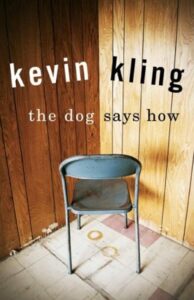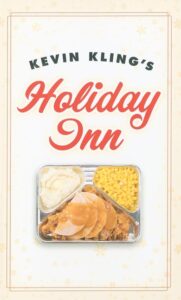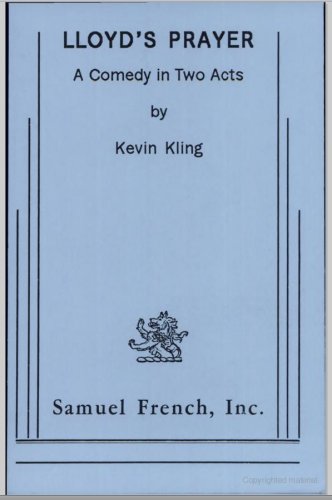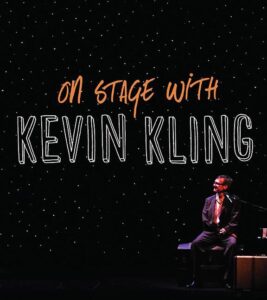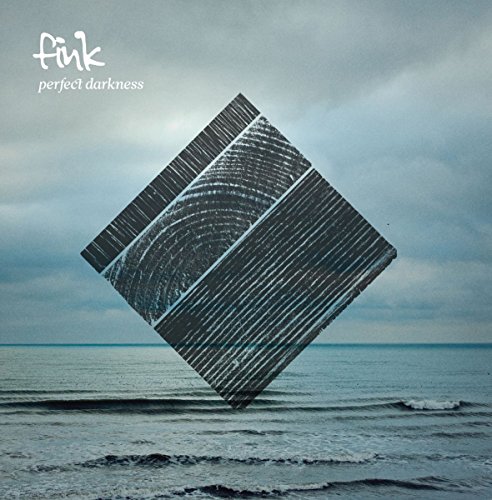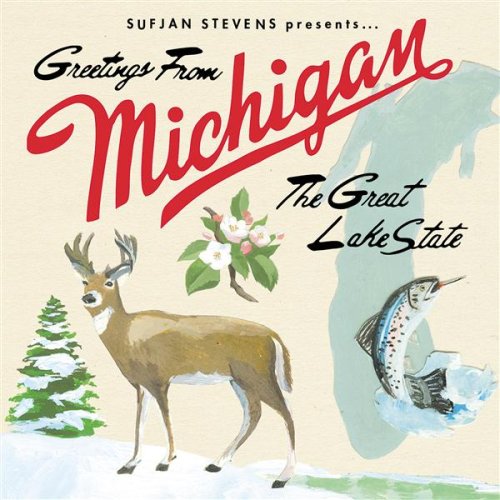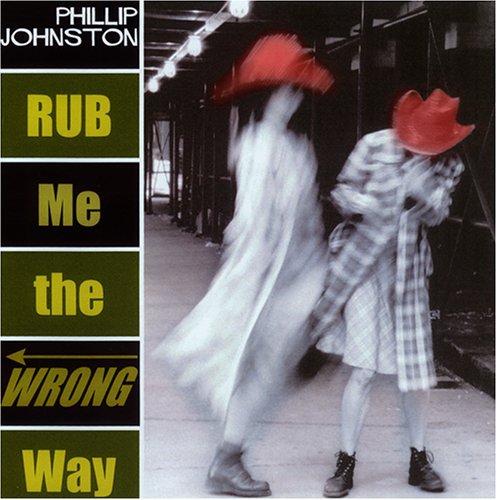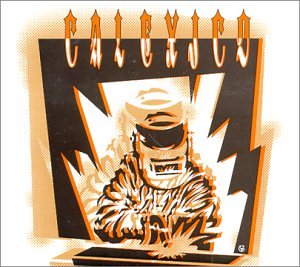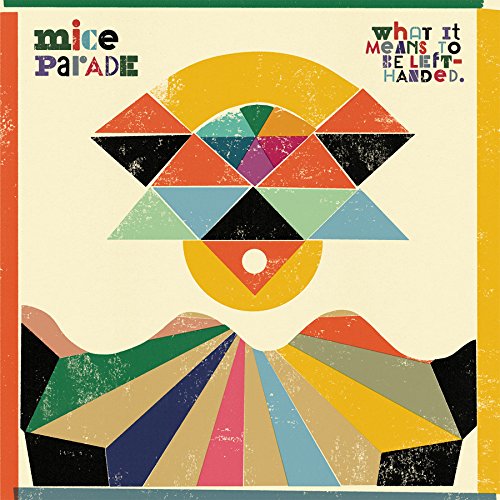Kevin Kling
The Losses We Grow Into
We are digging into the archives to celebrate some of the conversations listeners have loved the most and that have shaped this project. Kevin Kling is part funny guy, part poet and playwright, part wise man — homegrown Minnesota meets Dante and Shakespeare. He was also born with one disabled arm, and a midlife motorcycle accident paralyzed the other. Then again, being so-called able-bodied, Kevin points out, is always only a temporary condition. We take in his wisdom on the losses we’re born with and the losses we grow into — and on why we turn these things into stories.
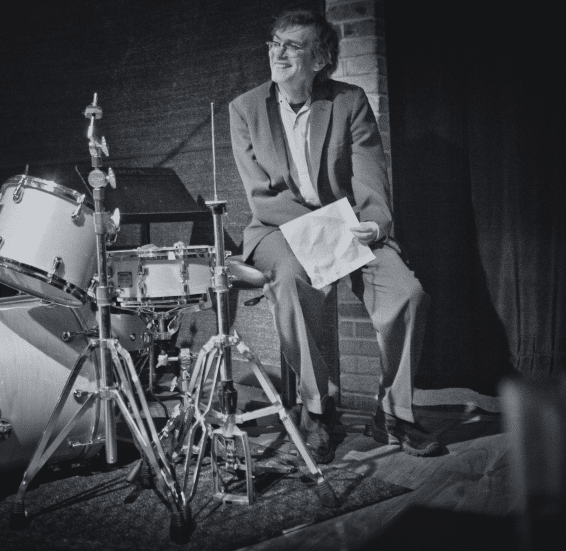
Image by Kevin Kling, © All Rights Reserved.
Guest
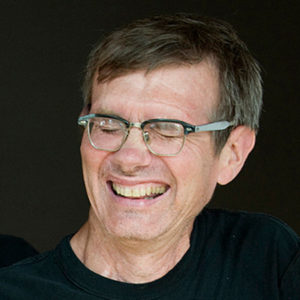
Kevin Kling is a performer and writer with Interact Center for the Visual and Performing Arts. He is the author of many plays, including 21A and Lloyd's Prayer and five books, including The Dog Says How and Holiday Inn.
Transcript
Krista Tippett, host: Kevin Kling is part funny guy, part poet and playwright, part wise man. A treasured figure on the national storytelling circuit, his voice inhabits an unusual space, where homegrown Minnesota meets Dante and Shakespeare. And his stories are revealing of both life’s humor and its ruptures. He was born with one disabled arm, and then a midlife motorcycle accident paralyzed the other. But then again, being so-called “able-bodied,” Kevin Kling points out, is always only a temporary condition. We take in his wisdom on the losses we’re born with and the losses we grow into, and on why we turn these things into stories.
Kevin Kling: The heart is an instrument, once broken, never repairs the same. I use the word “trauma” in my work, because a loss is a loss, whether it’s a heart, a limb, a promise, a person. It’s all loss, and it’s all trauma, and it’s all things that are broken that can’t be cured. You can’t go back. But you can heal it, and that’s an important thing to know.
Tippett: I’m Krista Tippett, and this is On Being.
[music: “Seven League Boots” by Zoe Keating]
As this show approaches its 20th year, we are re-surfacing some favorite shows that have delighted and shaped us and resonate still. This is one of them. I interviewed Kevin Kling in person in Minnesota, where we both live, in 2012. There’s something childlike, mischievous, and endearing in his eyes and his smile that live audiences warm to immediately. And most of Kevin’s stories include some reference point from his childhood in Osseo, Minnesota. He describes his family as “first generation off the farm” but still deeply imprinted by his grandfather, who, he says, “always smelled like tractor grease, even in church.” And he remembers his grandmother’s kitchen as an artist’s studio. As he’s written: “Whatever my grandpa provided as a medium, in a gesture she transformed, teased, poached, or pickled.”
It seems to me that, already at the beginning of your life, when you were a little kid, you totally became enchanted with the raw materials of stories, which are words. Do you remember how that happened? Or what was that like?
Kling: As I look back, I — language, in our family, we love language. We love to laugh. My family love to laugh. But more importantly — and this is early to touch on this already, but I have to say my left arm, being born with a disability, I think led me to becoming a storyteller, because rhetoric is immediately obvious and different, for someone with a disability, because you’re referred to and talked about in words that no one else is referred to. And so when people — I know when they would say my arm was “withered” or “crippled,” or say, “Oh, you poor thing,” or “What happened?” — words they chose — like I could tell if they blamed my parents or me or God or themselves for my condition, and then, with that information, I could get what I needed out of them. [laughs]
Tippett: Well, right. And that’s the other — you used the disability. You also definitely used it, as a kid, just as you …
Kling: But it’s as a kid would. As a kid, you’re looking for your angles, you know? And you’re looking for that all the time. But that also did really lead me to the power of rhetoric and the power of words, and down the road, to storytelling, and stories throughout my life. I was always blessed to be around good storytellers.
Tippett: What did you say? I thought this was a great line: “As a teen, I learned your night before was only as good as your ability to tell about it.” [laughs]
Kling: Right, that was — yeah, that was in college, with my buddies.
Tippett: You’ve written about words in phrases like “trafficking in the alphabet”; “words, like dormant gods, waiting to unleash their power.” But I think the context you just described is — it shines a different light on that power of words.
And you’re very theological — I don’t know if you always were; it’s in there now — but even, as you wrote in one place about being a kid, “Remember being a kid? We dance with all we have. We wear Superman outfits to the grocery store. As children, we are closer in time to the Creator.” Did you have thoughts like that, too, when you were a child?
Kling: I think so. I think I realized who I connected with, and I connected with my grandparents. And I think we were in the same light. I mean, I was in the dawn, and they were in the twilight, but we were in the same light. And because of that, they’re heading to the creator, and I’m coming from the creator. And it seemed, because of that, we spoke a very similar language. And I wondered, even as I was getting older and as I look back, where that goes, because it does go. We become really entrenched in this world. And then, as time goes on and we come into the nearer of — the end of our lives, we go back to that point. And this time, we’re headed — now we have the names for it. Before, we had the visceral feeling of the creator, but now we have the names, and we know what to call it.
Tippett: You mean as we move through life, as we become adults? And I think you’re also the first person I’ve heard about who seems to have a genetic predisposition for getting hit by lightning, which does have its dramatic religious overtones, as well. [laughs]
Kling: Everybody — well, I used to tell the story that every male in my family got hit by lightning. But my mom took one through the TV, and the first thing she …
Tippett: She did?
Kling: Yeah, and she called me up and said, “I knew it wasn’t just from your father’s side.” [laughs] That’s the first thing she said.
Tippett: [laughs] Or is it maybe infectious, that she got it?
Kling: I don’t know. There is actually a physiological reason — that lightning does look for the easiest path to the earth. And so as it’s coming down, if you are the easiest path, it will take you. And I think — and even my brother and I, in shop class in junior high, they had this test where they put a wire in, and it measured your conductivity, the amount of moisture in your skin. And my brother and I are the only two to put the needle in the red. And so we must have a lot of something, moisture in us or something.
Tippett: You’re a conductor. [laughs]
Kling: We’re somehow — yeah.
Tippett: So you mentioned your arm, and you also had the unusual experience of knowing about, as you’ve said, disability you’re born with and disability you acquire later in life, and the difference between those two experiences. And it’s always been kind of a tool for you, in a way, as a child and then as a humorist, also, right?
Kling: It is. It’s a really — you’re always looking, especially as a storyteller, a way into finding a point of trust with your audience or with who you’re with. And having something as obvious as my arm was always a good point to start the trust. Some people compare storytelling and stand-up. “What’s the difference?” we’re often asked. And the difference to me is that stand-up is aiming — they close the door with a joke. A storyteller, we really open the door with a joke. And so humor is, again, a way to establish a trust, because when you laugh at the same thing, it means you come from the same place. It’s a point of recognition. One thing that’s also, as a kid that really paid off was, when people see something different, they immediately have assumptions. And you can either feed into those assumptions or take them away from those assumptions. And the choice is yours.
Tippett: I love the way you break up the word “disability” …
Kling: Oh, yeah.
Tippett: … especially the “dis-” in “disability.”
Kling: Yeah. Well, that’s a really a long topic that starts with “dis-”. I remember, when you read Dante, when you read he goes to Dis, it’s the underworld. I think there’s quite a connection between the underworld and having a disability, because — well, as Dante puts it, Dis is the underworld. It is the place of shadow and reflection, where you round off the rough edges of torment and desire: you go to this world of Dis. And it’s the prefix for “disability,” which doesn’t mean “un-ability,” it means “able through the world of shadow and reflection.” And so it’s just another way of doing things.
But it is through that way, and it is literally having a foot in two worlds. And especially after my motorcycle accident — well, there was a guy in Minneapolis who saw the accident, and he thought I died. And he went around telling all …
Tippett: Right, I think the news came out that you had died, is that right — because of his eyewitness account.
Kling: And he believed it so strongly that even when it turned out I hadn’t died, he still believed it. And I see him on the bus every once in a while, and he thinks I’m a ghost.
Tippett: [laughs] Really?
Kling: And he looks right through me. Yeah, I’ll talk to him and he’ll just stare right through me, because he thinks I’m sent to haunt Minneapolis.
Well, he’s not entirely wrong. [laughs] I kind of still feel like I can’t extricate a foot from that world; that I think that he’s got a point. For the rest of my life, I will have a foot in another world.
[music: “Perfect Darkness” by Fink]
Tippett: I’m Krista Tippett, and this is On Being. Today I’m with storyteller and humorist Kevin Kling. In addition to his plays and comedy routines and poetry, he’s published several collections of his stories. The Dog Says How was his first book after that motorcycle accident utterly changed his life.
[music: “Perfect Darkness” by Fink]
I do want to read that first page.
Kling: The Dog Says How?
Tippett: The Dog Says How. [laughs]
Kling: I should probably tell people why it’s called that.
Tippett: Yeah, why is it called that?
Kling: Well, because when I got in my accident, I had to get voice-activated software, which is great, because you speak into a microphone, and then it writes what you say. But part of the problem is — that’s when I found out I had an accent, because it’s got to learn your nuances.
Tippett: You didn’t know before? [laughs]
Kling: No, I didn’t. And — well, it was like when the movie Fargo came out. Remember that? And people from here kept calling the radio station, going, “Hey, what’s the deal? We don’t sound like that.” I’m like, oh brother.
So I’m reading into the microphone, I think the Gettysburg Address. And as I’m — because it already knows what I’m saying, and it can pick up my nuances and then, from then on, know how to write what I’m saying. Well, my dog and cat got in a fight behind me, and the dog’s like, “Rooo, rooo, rooo,” and the cat, “Meow, meow.” “Roo, roo, roo.” “Meow, meow.” And the computer started writing, “How, how, how, why, why, how, how, how?” The dog’s looking at the cat, like, “How?” And the cat’s like, “Why? Why are you doing this?”
Tippett: [laughs] So great.
Kling: And that’s where The Dog Says How came from.
Tippett: So I’m going to ask you to read some stuff later, but I actually want to read this, and it’s very beautiful. It’s kind of like the preface, you would say — “On a Motorbike.” I just want to read the first lines:
“It all started because I wanted to fly.
I remember watching the barn swallows on my grandparents’ farm
fork-tailed acrobats of the sky
darting in and out of rafters
following roads only they could see
living life just ahead of their bodies.
God I wanted to feel that,
a foot in two worlds.
So I got a motorcycle.”
Which ends with you flying off the motorcycle.
Kling: Yeah, the last line is “and from my body I flew.” So it was a different kind of flight than I’d planned on.
Tippett: Right. And seems to me that, as you write now, it feels like — maybe this is true for all of us at various times in our life, that something happens and it reframes everything that comes after. But also, because you — I mean, it’s a very dramatic happening, and also because I think you’re somebody who, again, is always going back and forth in time and connecting dots between childhood stories and the stories of other parts of your life, it’s almost like the accident also reframes the stories you tell about the beginnings of your life.
Kling: It really did. When something like that happens, I mean — part of another thing I try to describe in a poem that I wrote is that when you are born with a loss, you grow from it, but when you experience a loss later in life, you grow toward it; that you are now — have become a person you aren’t, yet. You’re still the old person, and you have to grow into that person that you were. And so for me, going back into childhood and finding out where the pieces that fit with this new person belong is, again, part of the journey. I have to go back and reframe my childhood to fit with this new person that I am, not the person I was. And so that’s part of that exploration.
Tippett: So what did you see, then, in your childhood that you hadn’t paid as much attention to before?
Kling: I think, mostly, human connections. This is when I’m — part of it is when this accident happened, because I do believe you spend the first half of your life running away from home and the second half trying to get back to home. [laughs] And when I had my accident was at a pivotal point — was I was still running away from home. And I had my accident, and on this journey back to home, coinciding with this person that now is searching back through these people, I’ve started to embrace people I used to run from, my parents and my grandparents, understanding them on another level, understanding the choices that they made, at times, that really either upset me or I didn’t understand —now going back and reliving those times through a point of connection.
And before that, my stories really involved adventure and travel — again, that running from. And this has really created a different form of retrospect. And again, it’s person-driven.
Tippett: Right. Right, it’s true there are lots of stories about your brother, also, maybe, and even childhood escape, where you may be staying in the same place, but you’ve created universes that you go to.
Kling: Yeah, it’s a different world now.
Tippett: And it seems, when you write about that, that it was really a near-death experience in a sense, right? You felt like you could have gone either way.
Kling: It did, at that point where I can only assume is the point of impact, was a — given a choice to follow a great sense of peace or to return to this plane. And I returned, and one of the struggles I will always face is, “Why did I return? Why did I choose tension over peace?” And obviously, it was a choice.
I remember you had a quote on one of your shows, where Rabbi Heschel said, “When we pray, don’t pray to get things, pray to be worthy to get things.” And that’s becoming clearer and clearer as time goes on.
Tippett: Talk some more about that, because that’s also a theme that I feel like your whole sense of prayer — what it means, what it does — that that has completely shifted.
Kling: It has. And one of the stories that I tell is about the three phases of prayer, the first being pray to get things. I’d pray, you know, as a kid — especially, there was a squirrel monkey in the back of Spider-Man comics — it was for $9.99, and I wanted that squirrel monkey so bad. So I remember around Christmas time, I’d pray to God to ask Jesus to tell Santa to get me that monkey. [laughs] And then it shifted to prayers, in college, to get me out of things and, you know, save me. I’m in over my head here. [laughs]
And the story I link to that is when I was on the island of Ios, in the Mediterranean, and I wanted to get back to Athens, but I reached in my pocket, and I only had $20, and I still wanted to see Italy and Ireland. So I stowed away on a boat. And the guy next to me, a French guy, said, “They haven’t even come around for tickets, and when they find you, they’re going take you below.” He said, “This happened to a buddy of mine. They’ll beat you with socks full of soap, because it won’t show bruises.” And I said, “Well, I’m an American. No, they won’t.” “Oh God, they’re going to love you,” he said. So when they came up, I hid behind these barrel depth-charge things, and they saw my shoes, and I climbed over a ladder, and I’m hanging over the water, and I prayed — I bet I hadn’t prayed in 10 years. And I prayed, “Get me out of here. Please, God, I won’t ever do anything this stupid.”
And then the third phase of prayer, I was in rehab in the hospital, and while I was in rehab, 9/11 happened. And I watched it on TV, and I didn’t think it was — I thought it was another TV show. And I saw 9/11. And then, after that, I had post-traumatic stress, and I was in sync with the country. We all were going through post-traumatic stress at the same time — it was like, going from denial to anger to vengeance. And I had to take an elevator down to the bottom floor every day and try to walk half a block. That was like, my job.
And I’d walked my half a block, and that’s when Mary — my wife, Mary — met me in the lobby, and she bought an apple for me. And I hadn’t — food had no taste, so I was losing a lot of weight. And she said, “Just take a bite, just for me.” So I took a bite, and flavor — that was the day it came back. And the sweetness came in, and when the sweetness hit my tongue, I started to cry, and it was flushing out all the antibiotics and toxins that I had. I hadn’t cried in years. And my eyes were burning, and with my burning eyes and the sweetness in my mouth, it just felt good to be alive. And I just remember thinking, thank you, thank you, thank you, thank you that I lived. And that — my prayers shifted to thanks.
And then I couldn’t tell whether, after that, good things were happening because I was saying thank you, or they just — I was noticing them. But there is blessings in my curses, even today — I mean, every day.
[music: “Oh God, Where Are You Now? (In Pickeral Lake? Pigeon? Marquette? Mackinaw?) by Sufjan Stevens]
Tippett: I think you’ve written about crying more easily as also just an effect that’s now a part of your life in a way that it wasn’t before the accident. Is that right?
Kling: Yeah, it is. Tears come much easier. And it is; it’s the way we flush out our toxins. It’s the way we — there’s a lot to tears, the salt in them. It’s just — they do a lot for us.
Tippett: I was wondering, as I was reading that, if you ever heard that Eastern Orthodox Christianity has a notion of the “gift of tears” — that it’s like a charism, a grace, a gift?
Kling: It is. Do you know how good you feel after a cry? It’s like an inward sauna. [laughs] Something happens that comes out, and you just feel really refreshed after a good cry. I try and — in the stories or shows that I do, in a good evening there will be as much crying as laughing, because I think both have such healing qualities.
Tippett: But it really gets trained out of us, right — especially out of men, maybe.
Kling: I think it does.
Tippett: That’s a cliché, but …
Kling: Well, no, it’s — but it’s true.
Tippett: I have a son, and I see that he even, from a young age, he got this idea that crying is something he stops himself from.
Kling: That’s why we have sports movies. I tell you, get him in — I tell you, Bad News Bears still gets the waterworks going in me. Don’t worry, you get him in front of a sports movie, he’ll lose it, yeah.
Tippett: [laughs] All right. Thank you for that. Something else you said about one of the gifts after the accident is, “Nothing is boring anymore.” Is that still true?
Kling: Oh yeah. I don’t think it ever was boring. I mean, I was always pretty entertained. We grew up — but you know, we grew up in that time when moms would go in the grocery store and leave you in the car. They might crack a window. And you look over and there’s a —
Tippett: Boredom was the only element you had to work with. [laughs]
Kling: It was. But you’d look over in the car next to you, and there’s another kid looking over at you. That’s the way we did things. And I remember being on my grandparents’ farm, and we called it unstructured time. But it was boredom. We had unstructured time, which was great, because then we got to invent. We got to create our worlds. And I always credit — that is why I’ve never been bored since. I do say I’ve been to plays where I wished I was somewhere else, and somewhere I would have fallen asleep if I hadn’t been the one talking. But I haven’t been bored.
Tippett: I want to talk some more about storytelling and what you know about the power of stories. One way you talked about — it feels like you made this choice to come back, to be alive, even if you didn’t — and that it was a choice, even if you’re not sure — the question mark for you is why did you decide?, but that you’ve written about that as you’ve had a chance to “rework your ending” of your story. Here’s something else you said about the power of stories: “When I turn something into a story, it doesn’t control me anymore.”
Kling: Right. Now, I can take you the long way through this or the short way.
Tippett: Well, do, and I’ll tell you why. I think this is so important, because storytelling comes up in so many of my different conversations.
Kling: And I think about it a lot, because it’s my bread-and-butter.
Tippett: Right, but it’s the element of meaning-making, and it always has been, for human beings.
Kling: It is.
Tippett: But in the latter half of the 20th century, I think, when you and I were being born, we were — we got very technical and systematic and felt like we would be able to discover everything and have the systems to make things work, and facts were powerful. But it’s not — it was never the whole story. It was never the whole story of being human.
Kling: But with every discovery, a million more mysteries come up. The mysteries never stop. And the ambiguity gets greater. We live in this time where it’s harder to follow a light. It’s more important to find solace in the mystery. I think that that’s what storytelling is about.
But I want to get back to, too, at some point, storytelling and healing, because something happened very recently to me that has changed everything. And I want to get back to that, but I got to get to that. I tell about why I tell stories by telling a story. And it starts with my neighbor Ben is at my house, and we’re turning a glass door into a screen door. And by doing this, we’re putting the glass door over a garbage can, and I’d given him a ball-peen hammer, and he’s smashing the panes out. And then I’m going to put mesh in it and make it a screen door.
And so he’s nine years old, and he’s smashing out this glass. And all of a sudden, he stops, and he goes, “Are there jobs like this?” And I go, “Yeah, I got one.” And that’s how I think about my job. And meanwhile, his brother is running up and down in front of the house, he’s got a towel wrapped around his neck, his arms are out in front of him, and he’s going — he’s three years old, John Griling — and he’s going, “I’m Batman, the animated version!” And I go, “Hey, John, get in the house.” And he comes in — and he always draws me a picture on our dining room table. And on this day, he draws a circle. For the first time, he drew a circle. And he runs out the door with this thing, and he comes back the next day, it’s all wrinkled. And I could tell he’d slept on it. And he put in eyes and a mouth, and he drew his first face. And it was somebody he could tell what to do. And that was a big day for him. Now he had control over things, somebody he knew or he didn’t know, it didn’t matter.
But that’s exactly how I use stories, is that by telling a story, things don’t control me anymore. It’s in my vernacular. It’s the way I see the world. And I think that’s why our stories ask our questions, our big questions, like where do we come from before life, after life? What’s funny in this world, or sacred? And even more importantly, by the asking in front of people and with people, even if we don’t find the answer, by the asking, we know we’re not alone. And I have found that often that’s even more important than the answer.
And so it’s that idea of belonging — and we are social beings — that idea of a comfort in the mystery. And that’s where stories — I’ve got a buddy up in Lac Courte Oreilles, and he says that — he’s a medicine man. And he said, “You can survive anything with sense of humor and sense of self.” And our stories give us both of those. Laughter is the same thing. When you’re laughing at something, it can’t control you.
[music: “The Further Adventures of Slap & Tickle (Tango)” by Phillip Johnston]
Tippett: Kevin Kling. Some listeners may recall his charming NPR commentaries in the early 2000s. This is from one he did titled “The How and Why of Life and Death.”
[music: “The Further Adventures of Slap & Tickle (Tango)” by Phillip Johnston]
Kling: I think when it comes to the underworld, most people are either dogs or they’re cats. It’s either How? or Why? For me, the underworld is like a good haircut — that it probably falls between something I had and something I wanted. But we just don’t know. We do know whenever you take a trip, there’s the trip you plan, and then there’s the trip you take. Time was, only a select few got to visit the underworld, like Odysseus, Orpheus, Dante, Nixon. Now anyone with enough money can go to hell. When I had my accident, I got a glimpse of things to come, and I’ve grown used to the fact that I do have a foot now in two worlds.
Look, we all have things that haunt us — ghosts, things that we can’t find a home for, that go bump in our hearts and minds. We call them names like sins or regrets or desires. And they seem to fall into two categories, kind of like Kentucky Fried Chicken — they’re either original or extra spicy. OK, original ones are the ones we get before birth, little tiny time bombs lurking in our genetic weed bed, just waiting to spring into acts of passion or illness. We can’t do anything about those. We don’t even know why they’re there. They’re like that tae kwon do school in a shopping mall. Why’s that there? It just is.
Then there’s the haunts that we create by losses or choices made in life, and they tend to trouble us even more. And our great fear is that they will follow us into the afterlife.
Ever since my accident, I don’t fear death. I get a sense of peace to think I’ll see my ancestors, friends that I’ve lost, my dad, my first dog, and my arm. But until then, it’s how, how, why, why, why?
[music: “Muleta” by Calexico]
Tippett: After a short break, more with storyteller Kevin Kling, a favorite from our archives. I’m Krista Tippett. Stay with us.
[music: “Muleta” by Calexico]
Tippett: I’m Krista Tippett, and this is On Being. Today I’m with storyteller and humorist Kevin Kling, part funny guy, part poet and playwright, part wise man. He was also born with one disabled arm. A midlife motorcycle accident nearly killed him and took away the use of his other healthy arm. As he’s been describing, he feels he made the choice, after that accident, to go on living — to inhabit both disability and wholeness.
And you said a minute ago that you had a story about stories and healing, or something you’ve learned just recently.
Kling: Yeah, and this has become my new — this is my struggle, these days, is that after my motorcycle accident, I had post-traumatic stress. And I couldn’t sleep, I had anger issues — it just really had changed me as a person.
Tippett: Can I just say, also, that you’re so delightful, and you’re so funny, and I think it’s really good to hear that part of it, too.
Kling: Oh boy.
Tippett: You know what I mean? Because you can speak so eloquently about what you learned and the gift of it and the grace of it and — but you’ve won all that. It was hard-won, right? It was wrested out of these dark places.
Kling: It still is, and this part of the struggle, this — exactly, because all of a sudden, all those buffers that when — anger, I could go straight to it. And I work in a theater company of performers with disabilities, and …
Tippett: I want to talk about that later.
Kling: Oh good, because I’ve learned so much from them, and one of the things is about anger, is that it is a tool, and it can get things done, but to me, it’s like pain. It’s really — it’s not the answer, it’s an indicator that something’s wrong. And you can’t find the answer through the anger, you can just know something’s not right.
Tippett: That’s helpful.
Kling: Anyway, with this post-traumatic stress, a few months ago, after years and years, it came back with a vengeance. And I went to a therapist, and she said, “You got to understand, this isn’t — it’s not time-related. It sits in such a deep place that it’s not triggered in ways you would think. It’s not something that time heals. It will come back.” And so what she had me do, which was so right, fit just with my weird Jungian sensibility — [laughs] she had me tell the story of my motorcycle accident. It was a bit more complicated than this. She told me the story, but instead of hitting the car, I missed the car, and I went to where I was going. And by retelling the story and having a different outcome, I started sleeping better. I started — all of a sudden, the post-traumatic stress really dissipated in a significant way. And it was because I retold the story in another way that had me survive in another way.
Now, the struggle with me is, I still wake up in the morning with my arm not working, with all these things, so there’s a reality, and then there’s another story I’ve created. And it really seems to fit with the way we work as humans, especially these days. We need to rewrite our stories, sometimes, just so we can sleep at night. But it’s not the reality. But we can’t live in the story that makes us sleep, but we need it to sleep. And so that’s my struggle now: putting those two together; taking the myths we form to make ourselves feel better and fitting it with the reality that we live in.
Tippett: So something you talk about that — that there’s a difference between healing and curing …
Kling: Oh, a big difference.
Tippett: … and it seems connected, to me, because it’s related to what you’re saying, that there are ways in which we need to heal, which are not going to be about everything being all right.
Kling: No, and anyone that’s ever had their heart broken knows exactly that. The heart is an instrument, once broken, never repairs the same. Yet, even though it can’t be cured, it can be healed, and you can love again. But that heart isn’t the same heart that was broken the first time. And any time you experience loss — whenever I use the word “trauma” in my work, the word “loss” I usually replace, as often as I can, because a loss is a loss, whether it’s a heart, a limb, a promise, a person. It’s all loss, and it’s all trauma, and it’s all things that are broken that can’t be cured. You can’t go back.
But you can heal it, and that’s an important thing to know.
Tippett: I just think, also, aging is incremental loss.
Kling: It is.
Tippett: [laughs] Here’s one of your lines: “If you are ‘able-bodied,’ it’s only a temporary condition,” which is to say that everything you’re describing that you learned through disability, disability inborn or acquired, it’s kind of an expanded version of something that, in fact, is very mundane.
Kling: It is. It’s what happens to everybody. We all experience loss. And it’s part of being human. It’s part of our experience. And it’s not something you necessarily cherish. I mean, to me, I associate it with being an artist. Nobody’s an artist on purpose. It’s something that happens to you and that then you create from there. It’s like when you’re a person and you experience these losses, it’s what gives us our richness. It gives us our wisdom.
Tippett: But it’s hard.
Kling: Wisdom’s not cheap, you know? We do — we pay for it.
Tippett: Right. Well, so this conundrum of needing the stories that can help us sleep at night, but knowing that — what are you saying? That it can’t, in fact, be defining? That you’re going to have to still move beyond that story?
Kling: Yeah — I think, again, this is again living in a world of ambiguity, living in these world of paradoxes. Part of me, now that I see that and recognize that, now I’m all excited about it. Now it’s something I get to figure out.
Tippett: [laughs] You get to use it.
Kling: Exactly, I get to talk about in front of people. And slowly — that one is one I don’t think I’ll ever bridge. I think now I’ve got a lifetime of work that I can’t wait to explore. And it really is the essence of storytelling, of what we do, of theology, is that connection of myth with reality, and the need for both of them.
[music: “Nickel Mountain” by Tin Hat Trio]
Tippett: I’m Krista Tippett, and this is On Being, today with Kevin Kling. In his 2011 play Joice Rejoice, he experimented with ideas about the boundary between life and death. It’s a playful and poetic retelling of the biblical story of Lazarus, where Jesus responds to the plea of Lazarus’s sisters and brings him back to life after he’s been dead for four days. Kevin Kling is also passionate about his involvement with Interact, a theater and visual arts group composed largely of people with varying disabilities.
[music: “Nickel Mountain” by Tin Hat Trio]
So tell me about Interact.
Kling: I just, I feel so fortunate to be part of it. Oh boy, I could tell so many stories. But one recently that really keeps reoccurring — one of my friends, Ingrid, she has aphasia. And aphasia is a condition that makes — it’s difficult for thoughts to become words. And Ingrid said, one time, before her aphasia she used to feel, “I think; therefore, I am.” But now she knows we come from deeper place. Now she feels, “I am; therefore, I think.”
And when she told me that — that has come back, time and time again, when I remember — at that point of that accident, when you think of being down the middle — with the past, they say when you dwell on the past, it’s regrets. When you dwell on the future, it’s anxiety. How do you find that middle road, that sensual middle road?
And when you can ride that, the things that fall away — when the symbols fall, the myths fall, the words fall, and you get to that point right before the emotion of the experience, you really are at a point: “I am; therefore, I think.”
But you can’t hold it. But you know it’s there. You know what I mean?
Tippett: Yes, and somehow that not being able to hold it is also part of that human condition.
Kling: It is. It’s the beauty of it. It’s like love or truth or beauty. It’s those things that can’t be held. It’s those things that we keep trying to get back. It’s that idea of recreating, which — if we’re created in God’s image, if we are creations, then we, too, are creators. And the thing that I love about the idea of God, then, is that you know, as a creator, your creations continue to surprise you.
Tippett: As we draw to a close, more theology that I find in you — you compared yourself to Lazarus, right … [laughs]
Kling: Oh yeah.
Tippett: … after you came back from the dead, when you flew off your motorcycle.
Kling: The story of Lazarus, that’s one I just touched on; I did a play that — the character of Lazarus and his connection with Jesus. And I loved his sisters — one was supposed to be Mary Magdalene; and the other sister, Martha, who was so mad at Jesus, because he left him down there for four days, and she’s like, “Bring him back” — and just that we don’t get, through the bible, what Lazarus went through and where he was, what that four days. So I wanted to explore that in this play, about what happened on each day. When did he run into the rich man that was left behind? What did the rich man give him? What were his first days like of getting used to living in this world that was devoid of sensual nature?
I mean, when we talk about living and riding that line, it really is living the senses, living the five senses. When you are living them, then you are the most awake that you will be.
Tippett: There’s a lot of, in that play — I mean, it was just full of the bible. It really was a biblical play. Have you worked with the bible in that way? Is that new?
Kling: It is new, for me.
Tippett: Post-accident new?
Kling: Again, yeah. It took me a long time, because I grew up — the bible was really difficult, because there were so many people telling me what was in it, I forgot that — like, I learned through fairy tales. I learned that when you retell a fairy tale, you can tell it the way you want to tell it. You can tell a story the way — what touches you in the story. I mean, even Jesus has four different versions. And so even — there’s markers for that.
And I never liked fairy tales, because the guy with the disability always got the short end of the deal. And the other …
Tippett: So who’s that? Who would be the guy with …
Kling: Well, like the seven dwarves: Snow White trades in seven good ones for one — perfectly good little ones for one big one. And the ugly duckling — OK, this one was a particular thorn for me, because the ugly duckling — it’s all going great when he’s this large uber-duck. I love that, this big duck. But then they find out he’s a swan. And so all of a sudden, he’s not a duck anymore, he’s a swan.
Well, when you’re a kid with a disability, what does that do? You hope a ship of aliens lands and goes, “No, you’re really one of us,” because — but you’re stuck living with ducks. And so when I learned you could tell them the way you saw them, through your own eyes, and that fairy tales were meant to be told, and told to get your point of view across, then I got to change them around and thicken them up.
And then, with the bible, sticking to it, but there’s clues and hints and things inside the bible that really relate to what I’m going through.
Tippett: In a way, also — and not just in the bible, but in the heart of religious tradition, there’s so much of that, just, thank you for being alive that you discovered …
Kling: Oh man, David, yeah.
Tippett: … after your accident. And that’s also kind of lost, in a lot of the way religion came down to us in childhood.
Kling: It’s with that create and recreate, it’s the joice, rejoice. It’s that remembering that joy, that original joy: recreating, rejoice. And yeah, that’s the key.
Tippett: There’s a line that you wrote about, identifying with Lazarus. You said, “I wish I was so certain. I have doubt. I have doubt. But there is freedom, in that instead of a path, I’m finding solace in the mystery.” And you’ve said that, also, that mystery is so important.
And then I was really struck by this little essay, “Racing Toward Solace,” in The Dog Says How.
Kling: Oh wow.
Tippett: And there was a little — you tell a story, it’s right near the end, that “Back in the days when pots and pans could talk …”
Kling: Oh yeah, yeah!
Tippett: [laughs] I don’t know. I’m not even sure. It’s not like I read this and I know exactly what it means, but I feel like it — somehow, it expresses a lot of the essence of you. I mean, it’s a very simple thing, but I wondered if you would read that.
Kling: Sure. I might — should I do that “Tickle” — we’ve been talking about — should I do “Tickled Pink”?
Tippett: I love this, “Tickled Pink.” So if you wanted to read that, I think it’s amazing.
Kling: Yeah, that’s one that’s kind of — I end a lot of shows with that one. So the …
Tippett: “Back in the days when pots” — just that …
Kling: “Back in the days when pots and pans could talk, which indeed they still do, there lived a man. And in order to have water, every day he had to walk down the hill and fill two pots and walk them home. One day, it was discovered one of the pots had a crack, and as time went on, the crack widened. Finally, the pot turned to the man and said, ‘You know, every day you take me to the river, and by the time you get home, half of the water’s leaked out. Please replace me with a better pot.’ And the man said, ‘You don’t understand. As you spill, you water the wildflowers by the side of the path.’ And sure enough, on the side of the path where the cracked pot was carried, beautiful flowers grew, while other side was barren. ‘I think I’ll keep you,’ said the man.”
Tippett: I don’t know. For me, somehow, that felt like just a picture of living with disability, living with loss, as a human being.
Kling: I think that — well, the story says it, but I think it is looking at — especially living on the fringe and, again, being recognized for what we bring, not for what we aren’t. And it is that world of the “dis-” of disability. It’s that other foot.
Tippett: I would love it if you want to read “Tickled Pink,” which is just beautiful. Tell me where this came from.
Kling: This came from — I did a show. I work with a group called Bad Jazz. [laughs] And it’s three guys that — we aren’t — I kind of plateaued in the junior high, as far as playing tuba, but I still love to do it. And so this was a song that I wrote, and it’s based on — the story is based on when you were feeling your best, my mom would say, “You’re in the pink,” which meant that your insides were pink. And so this poem is called “Tickled Pink.”
“At times in our pink innocence, we lie fallow, composting waiting to grow.
And other times we rush headlong like so many of our ancestors.
But rush headlong or lie fallow, it doesn’t matter.
One day you’ll round a corner, your path is shifted.
In a blink, something is missing. It’s stolen, misplaced, it’s gone.
Your heart, a memory, a limb, a promise, a person.
Your innocence is gone, and now your journey has changed.
Your path, as though channeled through a spectrum, is refracted, and has left you pointed in a new direction.
Some won’t approve. Some will want the other you.
And some will cry that you’ve left it all.
But what has happened, has happened, and cannot be undone.
We pay for our laughter. We pay to weep. Knowledge is not cheap.
To survive we must return to our senses, touch, taste, smell, sight, sound.
We must let our spirit guide us, our spirit that lives in breath.
With each breath we inhale, we exhale.
We inspire, we expire. Every breath has a possibility of a laugh, a cry, a story, a song.
Every conversation is an exchange of spirit, the words flowing bitter or sweet over the tongue. Every scar is a monument to a battle survived.
Now when you’re born into loss, you grow from it.
But when you experience loss later in life, you grow toward it.
A slow move to an embrace, an embrace that leaves you holding tight the beauty wrapped in the grotesque, an embrace that becomes a dance, a new dance, a dance of pink.”
[music: “Truth” by Balmorhea]
Tippett: Kevin Kling is a performer and writer with Interact Center for the Visual and Performing Arts. His plays include 21A and Lloyd’s Prayer. His books include The Dog Says How.
[music: “Recover” by Mice Parade]
The On Being Project is: Chris Heagle, Lily Percy, Laurén Drommerhausen, Erin Colasacco, Eddie Gonzalez, Lilian Vo, Lucas Johnson, Suzette Burley, Zack Rose, Colleen Scheck, Julie Siple, Gretchen Honnold, Jhaleh Akhavan, Pádraig Ó Tuama, Ben Katt, Gautam Srikishan, Lillie Benowitz, April Adamson, Ashley Her, and Matt Martinez.
The On Being Project is located on Dakota land. Our lovely theme music is provided and composed by Zoë Keating. And the last voice that you hear singing at the end of our show is Cameron Kinghorn.
On Being is an independent, nonprofit production of The On Being Project. It is distributed to public radio stations by WNYC Studios. I created this show at American Public Media.
Our funding partners include:
The Fetzer Institute, helping to build the spiritual foundation for a loving world. Find them at fetzer.org;
Kalliopeia Foundation, dedicated to reconnecting ecology, culture, and spirituality, supporting organizations and initiatives that uphold a sacred relationship with life on Earth. Learn more at kalliopeia.org;
The Osprey Foundation, a catalyst for empowered, healthy, and fulfilled lives;
The Lilly Endowment, an Indianapolis-based, private family foundation dedicated to its founders’ interests in religion, community development, and education;
And the Ford Foundation, working to strengthen democratic values, reduce poverty and injustice, promote international cooperation, and advance human achievement worldwide.
Books & Music
Recommended Reading
The On Being Project is an affiliate partner of Bookshop.org and Amazon.com. Any earnings we receive through these affiliate partnerships go into directly supporting The On Being Project.





